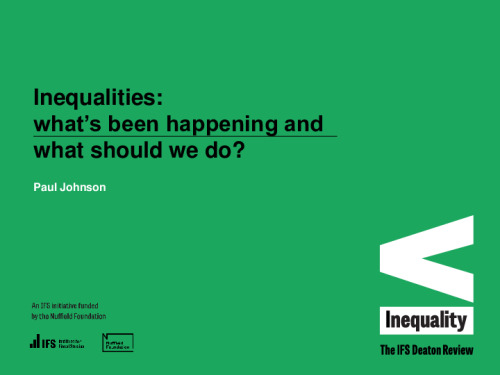Downloads

Download slides from the event
PDF | 1.11 MB
Paul Johnson, Director of The Institute for Fiscal Studies, gave a talk at the Oxford Martin School where he drew on the extensive work of the IFS-Deaton review of inequalities to look at how inequalities in earnings, incomes, wealth, and education have changed over time, as well as at inequalities between different sexes, ethnic minorities and age groups.
He asked to what extent these inequalities might matter from a public policy point of view, and what we might do about them. How they develop over time, and attitudes and policy towards them, will be fundamental in shaping the future of the UK.
Authors

Director
Paul has been the Director of the IFS since 2011. He is also currently visiting professor in the Department of Economics at University College London.
Presentation details
- DOI
- 10.1920/ps.ifs.2023.0003
- Publisher
- Institute for Fiscal Studies
Suggested citation
Johnson, P. (2023). 'Inequalities: which ones matter, and what to do about them?' [Presentation]. Oxford: Institute for Fiscal Studies. Available at: https://ifs.org.uk/publications/inequalities-which-ones-matter-and-what-do-about-them (accessed: 9 May 2024).
More from IFS
Understand this issue

Sure Start achieved its aims, then we threw it away
15 April 2024

Social mobility and wealth
12 December 2023

Why inheritance tax should be reformed
18 January 2024
Policy analysis

Major challenges for education in Wales
21 March 2024

Sliding education results and high inequalities should prompt big rethink in Welsh education policy
21 March 2024

Living standards since the last election
21 March 2024
Academic research

Labour market inequality and the changing life cycle profile of male and female wages
15 April 2024

Imagine your life at 25: Gender conformity and later-life outcomes
24 April 2024

A senior doctor like me: Gender match and occupational choice
24 April 2024